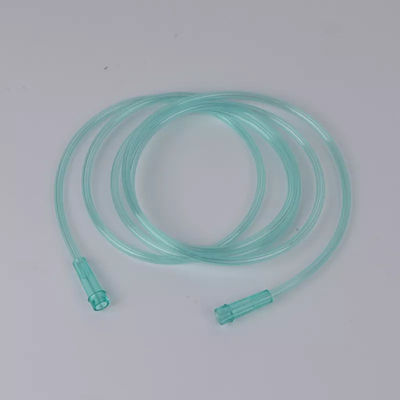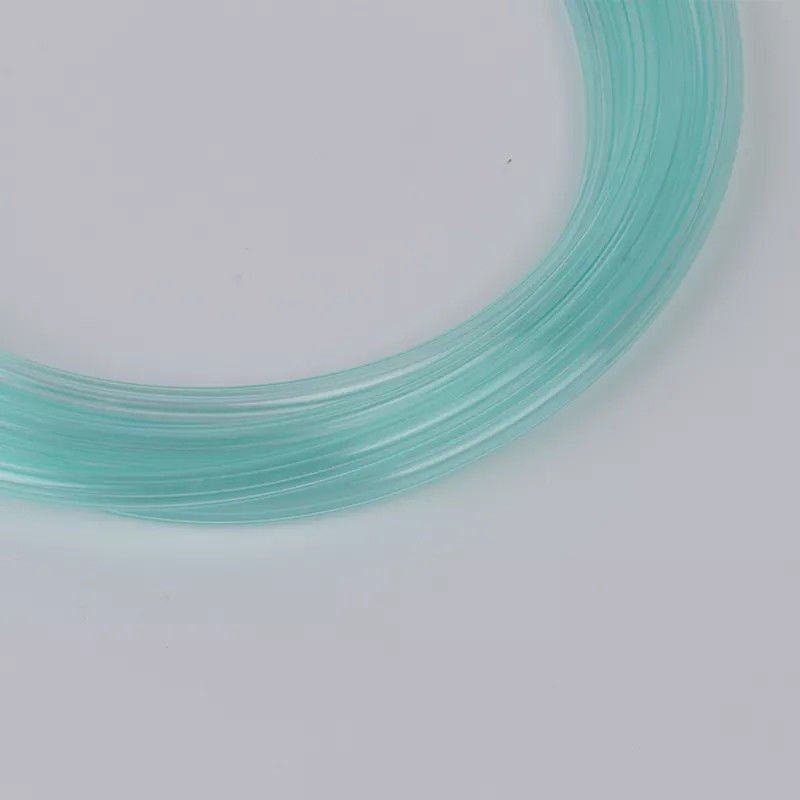
Disposable Medical Soft PVC Oxygen Cannula 2.1m Oxygen Connection Tubing
-
Highlight
PVC Oxygen Cannula
,PVC o2 cannula
,Medical Soft Oxygen Cannula
-
Name2.1m Oxygen Connection Tubing
-
Size7/10/14/25/50ft,or Customized
-
TypeGeneral Medical Supplies
-
Instrument ClassificationClass II
-
ColorClear, Green, Transparent
-
ApplicationMedical Surgical
-
Disinfecting TypeEOS
-
PackageIndividually Packaged
-
Place of OriginChina
-
Brand NameHenan Aile
-
CertificationCE
-
Model Number7ft Oxygen tubing
-
Minimum Order Quantity5000pcs
-
PriceNegotiable
-
Packaging DetailsIndividually packaged
-
Delivery Time15-30days
-
Payment TermsL/C, T/T
-
Supply Ability5000000pcs/ week
Disposable Medical Soft PVC Oxygen Cannula 2.1m Oxygen Connection Tubing
Disposable Medical Soft PVC Oxygen Cannula 2.1m Oxygen Connection Tubing
1. Disposable Design:
- The cannula is intended for single-use, and it is disposed of after each use. Disposable cannulas help maintain hygiene and prevent cross-contamination between patients.
2. Medical Soft PVC Material:
- The cannula is made of soft PVC (Polyvinyl Chloride), a flexible and lightweight plastic material commonly used in medical devices. PVC is chosen for its comfort and ease of molding.
3. Oxygen Cannula:
- The cannula is a flexible tube with two prongs that are inserted into the patient's nostrils. It allows for the delivery of supplemental oxygen directly to the patient's respiratory system.
4. 2.1m Oxygen Connection Tubing:
- The cannula is connected to an oxygen source through a tubing that is 2.1 meters in length. This tubing facilitates the flow of oxygen from the source to the cannula.
Key Features and Functions:
- Soft and Flexible:
- The soft PVC material of the cannula ensures patient comfort and flexibility. This is particularly important for individuals requiring continuous oxygen therapy.
- Nasal Prongs:
- The nasal prongs of the cannula are designed to be inserted into the patient's nostrils. They are typically curved to follow the contour of the nasal passages.
- Elastic Head Strap:
- An elastic head strap secures the cannula in place on the patient's head, providing a snug fit and preventing dislodgment.
- Oxygen Flow:
- The oxygen flow is regulated by the oxygen source and is adjusted based on the patient's prescribed oxygen requirements.
- Universal Connector:
- The cannula is designed with a universal connector that allows it to be easily attached to various types of oxygen sources, including oxygen cylinders or concentrators.
- Lightweight and Portable:
- The disposable and lightweight nature of the cannula makes it convenient for patients to use, especially in home settings or during ambulation.
![]()
Considerations:
- Proper Fit:
- Healthcare professionals ensure a proper fit of the nasal prongs to optimize oxygen delivery and patient comfort.
- Oxygen Flow Rate:
- The oxygen flow rate is set based on the patient's prescribed requirements. It is important to follow the healthcare provider's instructions regarding the flow rate.
- Patient Comfort:
- The soft PVC material and proper fit are essential for patient comfort. Any signs of irritation or discomfort should be addressed promptly.
- Disposable Nature:
- Since the cannula is disposable, it should not be reused to prevent the risk of contamination.
The connection between the oxygen tank and the oxygenation device, which facilitates the movement of the air into the body of the person who needs it. An oxygen tubing is simply the connector between the source of the oxygen and the nasal mask.
![]()
| Name | Oxygen Cannula Tubing |
| Size | 7/10/14/25/50ft |
| Material | Medical Grade PVC |
| Instrument classification | Class II |
| Color | Clear, green |
| Application | Medical Surgical |
| Disinfecting Type | EOS |
| Package | Individually packaged |
![]()
![]()
What size tubing is for oxygen?
The size of tubing used for delivering oxygen can vary, and the appropriate size depends on the specific application and the type of oxygen delivery system being used. The two common sizes of tubing used for oxygen delivery are 3/16-inch and 1/4-inch inner diameter (ID) tubing. The choice between these sizes often depends on factors such as the flow rate of oxygen and the type of oxygen delivery device.
This product is available in various tubing lengths: 7', 14', 25', 40', and 50'. This is oxygen tubing for standard oxygen regulators.
How do you connect oxygen tubing?
Step 1: Connect your nasal cannula to the tubing swivel connector.
Step 2: Connect your swivel connector to your tubing.
Step 3: Connect your oxygen tubing to the humidifier.
Step 4: Connect the humidifier with the nut to the concentrator unit.
Step 5: Total unit connection.


